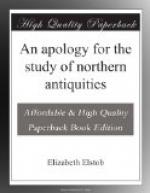O Glass! with too much Joy my Thoughts thou greets.
And again upon the Chamber where his admired Geraldine was born;
O! if Elyzium be above
the Ground,
Then here it is, where nought
but Joy is found.
And Michael Drayton, who had a Talent fit to imitate, and to celebrate so great a Genius, of all our English Poets, seems best to have understood the sweet and harmonious placing of Monosyllables, and has practised it with so great a Variety, as discovers in him a peculiar Delight, even to Fondness; for which however, I cannot blame him, notwithstanding this may be reputed the Vice of our Sex, and in him be thought effeminate. But let the Reader judge for himself;
Care draws on Care, Woe comforts
Woe again,
Sorrow breeds Sorrow, one
Griefe brings forth twaine,
If live or dye, as thou doost,
so do I,
If live, I live, and if thou
dye, I dye;
One Hart, one Love, one Joy,
one Griefe, one Troth,
One Good, one Ill, one Life,
one Death to both.
Again,
Where as thou cam’st
unto the Word of Love,
Even in thine Eyes I saw how
Passion strove;
That snowy Lawn which covered
thy Bed,
Me thought lookt white, to
see thy cheeke so red,
Thy rosye cheeke oft changing
in my sight,
Yet still was red to see the
Lawn so white:
The little Taper which should
give the Light,
Me thought waxt dim, to see
thy Eye so bright.
Again,
Your Love and Hate is this,
I now do prove you,
You Love in Hate, by Hate
to make me love you.
And to the Countess of Bedford, one of his great Patronesses;
Sweet Lady yet, grace this
poore Muse of mine,
Whose Faith, whose Zeal, whose
Life, whose All is thine.
The next that I shall mention, is taken out of an ingenious Poem, entituled, The Tale of the Swans, written by William Vallans in blank Verse in the time of Queen Elizabeth; for the reprinting of which, we are obliged to that ingenious and most industrious Preserver and Restorer of Antiquities, Mr. Thomas Hearne of Oxford;
Among the which the merrie
Nightingale
With swete, and swete (her
Brest again a Thorne.)
In another Place,
And in the Launde, hard by the Parke of Ware
Afterwards,
To Ware he comes, and to the Launde he flies.
Again,
And in this Pompe they hie them to the Head.
I come now to the incomparable Spencer, against
whose Judgment and
Practice, I believe scarce any Man will be so bold
as to oppose himself;
Assure your self; it fell
not all to Ground;
For all so dear as Life is
to my Heart,
I deem your Love, and hold
me to you bound.
Again,
Go say his Foe thy Shielde with his doth bear.




